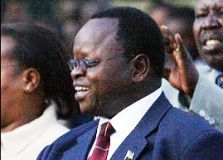S. Sudan peace process seen on track despite delay
By Andrew Cawthorne
NAIROBI, June 14 (Reuters) – The formation of Sudan’s new government after a peace deal ending two decades of war in the south remains on track despite a delay over negotiating the constitution, key players said on Tuesday.
 “It takes time for a baby to grow … Don’t write off the Sudanese,” said Kenya’s General Lazarus Sumbeiywo, who helped mediate the January accord between the Sudanese government and the former rebel Sudan People’s Liberation Movement (SPLM).
“It takes time for a baby to grow … Don’t write off the Sudanese,” said Kenya’s General Lazarus Sumbeiywo, who helped mediate the January accord between the Sudanese government and the former rebel Sudan People’s Liberation Movement (SPLM).
He and others at a Nairobi meeting warned, however, that the Darfur conflict in western Sudan had distracted international attention from the south. Millions in Darfur face hunger and war trauma, and struggle without basic infrastructure and services.
Under the January peace deal, a new government in Africa’s largest country was to have been formed by July 9, incorporating members of both the Islamic administration in Khartoum and former guerrilla leaders from the animist and Christian south.
But that deadline appears to have slipped by at least a month to finalise wording of the constitution, particularly some sensitive religious references.
Senior SPLM official Samson Kwaje said the delay could be beneficial because northern-based Sudanese opposition parties, who were boycotting the negotiations, might come on board.
“We are delaying the presentation (of the constitution) so that other parties become part of the process,” he said at the Nairobi gathering for the presentation of a film on Sudan.
“We are not exactly very late.”
HUNGER
The southern Sudanese conflict — which killed more than 2 million people — began in 1983 when Khartoum tried to impose Islamic law on the entire country.
Oil, ethnicity and ideology complicated the conflict.
Kenyan general Sumbeiywo said the July 9 deadline was ambitious in the first place.
“They set times for themselves, some very unrealistic. If they sign the constitution on July 9 and a month later we get the government, we should give them a clap,” he said.
Despite the historic nature of January’s peace deal to halt Africa’s longest-running civil war, it has been eclipsed by conflict in the vast Darfur region.
Shocking the international community and drawing U.S. charges of “genocide”, government-backed Arab militia have terrorised locals since a revolt began there in 2003.
Tens of thousands have died and more than 2 million fled.
“With Darfur … the international community and media just drifted off and forgot about the south,” Sumbeiywo said.
Donors have promised $4.5 billion to bolster the southern peace deal. But aid workers say they are failing to send food needed to avert southern Sudan’s worst hunger crisis since a 1998 famine in which at least 60,000 people died.
“Right now, people are entering the hunger period,” said Ian Sinkinson, of the Sudan Advocacy Coalition group, adding people were reduced to eating wild fruits, nuts and leaves from trees.
The SPLM’s Kwaje said the problem was exacerbated by the uncontrolled flow of people returning to the south since the peace agreement. “It is a reality that this year there is going to be a lot of hunger … people dying.”
